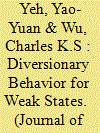| Srl | Item |
| 1 |
ID:
173981


|
|
|
|
|
| Summary/Abstract |
This paper explores the mechanisms and circumstances under which leaders in weak states adopt diversionary behavior to deal with domestic problems. We examine the case of Taiwan to see if its President, Tsai Ingwen, has adopted diversionary behavior from 2016 to the present. We found that, unlike great powers, weak-state leaders often resort to non-force tactics such as blaming foreign opponents, but the emergence of diversionary behavior is conditional on the stability of their relationship with a major power. In the case of Taiwan, Tsai adopted a more confrontational foreign policy toward China only when USA–Taiwan relations had become more stable and more favorable toward Taiwan. Future work could continue to explore the circumstances and tools unique to weak states’ diversionary behavior.
|
|
|
|
|
|
|
|
|
|
|
|
|
|
|
|
| 2 |
ID:
170372


|
|
|
|
|
| Summary/Abstract |
The 2014 Sunflower Movement succeeded in blocking Taiwan's Congress from ratifying the Cross-Strait Services Trade Agreement (CSSTA), a bill that proposed to liberalize trade with China. Since most of the participants in this movement were students and NGO members, they had limited economic and political resources to influence policy change, which makes their success in stopping a trade deal remarkable. Many attribute this important success to an elite alliance with politicians inside the government, fueled by a personal rivalry between political elites. However, I argue that changing public opinion is the more important force behind the creation of the alliance. With original data from interviews with political elites, their staff members, and activists in Taiwan, in addition to secondary information, I confirm public opinion to be the major reason for the political alliance. This case illustrates that in some circumstances, public opinion outweighs the importance of elite rivalry in influencing political elite decision-making, and it could represent a key mechanism of democratic policy-making.
|
|
|
|
|
|
|
|
|
|
|
|
|
|
|
|
| 3 |
ID:
170374


|
|
|